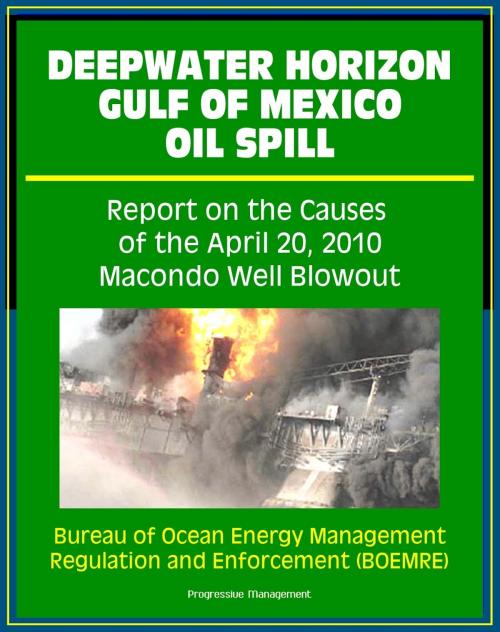Deepwater Horizon Gulf of Mexico Oil Spill: Report on the Causes of the April 20, 2010 Macondo Well Blowout
Nonfiction, Science & Nature, Science, Biological Sciences, Ecology, Social & Cultural Studies, Political Science| Author: | Progressive Management | ISBN: | 9781465939623 |
| Publisher: | Progressive Management | Publication: | September 15, 2011 |
| Imprint: | Smashwords Edition | Language: | English |
| Author: | Progressive Management |
| ISBN: | 9781465939623 |
| Publisher: | Progressive Management |
| Publication: | September 15, 2011 |
| Imprint: | Smashwords Edition |
| Language: | English |
This long-awaited report, issued on September 14 2011 by the Bureau of Ocean Energy Management, Regulation and Enforcement of the Department of Interior, provides authoritative, official findings on the investigation into the causes of the Macondo well blowout on the mobile offshore drilling unit Deepwater Horizon in the Gulf of Mexico on April 20, 2010.
At approximately 9:50 p.m. on the evening of April 20, 2010, while the crew of the Deepwater Horizon rig was finishing work after drilling the Macondo exploratory well, an undetected influx of hydrocarbons (commonly referred to as a "kick") escalated to a blowout. Shortly after the blowout, hydrocarbons that had flowed onto the rig floor through a mud-gas vent line ignited in two separate explosions. Flowing hydrocarbons fueled a fire on the rig that continued to burn until the rig sank on April 22. Eleven men died on the Deepwater Horizon that evening. Over the next 87 days, almost five million barrels of oil were discharged from the Macondo well into the Gulf of Mexico.
After an extensive investigation conducted by the Joint Investigation Team of the Bureau of Ocean Energy Management, Regulation and Enforcement ("BOEMRE") (formerly the Minerals Management Service or "MMS") and the United States Coast Guard, the BOEMRE panel of investigators ("the Panel") has identified a number of causes of the Macondo blowout.
The Panel found that a central cause of the blowout was failure of a cement barrier in the production casing string, a high-strength steel pipe set in a well to ensure well integrity and to allow future production. The failure of the cement barrier allowed hydrocarbons to flow up the wellbore, through the riser and onto the rig, resulting in the blowout. The precise reasons for the failure of the production casing cement job are not known. The Panel concluded that the failure was likely due to: (1) swapping of cement and drilling mud (referred to as "fluid inversion") in the shoe track (the section of casing near the bottom of the well); (2) contamination of the shoe track cement; or (3) pumping the cement past the target location in the well, leaving the shoe track with little or no cement (referred to as "over-displacement").
The loss of life at the Macondo site on April 20, 2010, and the subsequent pollution of the Gulf of Mexico through the summer of 2010 were the result of poor risk management, last-minute changes to plans, failure to observe and respond to critical indicators, inadequate well control response, and insufficient emergency bridge response training by companies and individuals responsible for drilling at the Macondo well and for the operation of the Deepwater Horizon.
This is a privately authored news service and educational publication of Progressive Management. Our e-books put knowledge at your fingertips, and an expert in your pocket!
This long-awaited report, issued on September 14 2011 by the Bureau of Ocean Energy Management, Regulation and Enforcement of the Department of Interior, provides authoritative, official findings on the investigation into the causes of the Macondo well blowout on the mobile offshore drilling unit Deepwater Horizon in the Gulf of Mexico on April 20, 2010.
At approximately 9:50 p.m. on the evening of April 20, 2010, while the crew of the Deepwater Horizon rig was finishing work after drilling the Macondo exploratory well, an undetected influx of hydrocarbons (commonly referred to as a "kick") escalated to a blowout. Shortly after the blowout, hydrocarbons that had flowed onto the rig floor through a mud-gas vent line ignited in two separate explosions. Flowing hydrocarbons fueled a fire on the rig that continued to burn until the rig sank on April 22. Eleven men died on the Deepwater Horizon that evening. Over the next 87 days, almost five million barrels of oil were discharged from the Macondo well into the Gulf of Mexico.
After an extensive investigation conducted by the Joint Investigation Team of the Bureau of Ocean Energy Management, Regulation and Enforcement ("BOEMRE") (formerly the Minerals Management Service or "MMS") and the United States Coast Guard, the BOEMRE panel of investigators ("the Panel") has identified a number of causes of the Macondo blowout.
The Panel found that a central cause of the blowout was failure of a cement barrier in the production casing string, a high-strength steel pipe set in a well to ensure well integrity and to allow future production. The failure of the cement barrier allowed hydrocarbons to flow up the wellbore, through the riser and onto the rig, resulting in the blowout. The precise reasons for the failure of the production casing cement job are not known. The Panel concluded that the failure was likely due to: (1) swapping of cement and drilling mud (referred to as "fluid inversion") in the shoe track (the section of casing near the bottom of the well); (2) contamination of the shoe track cement; or (3) pumping the cement past the target location in the well, leaving the shoe track with little or no cement (referred to as "over-displacement").
The loss of life at the Macondo site on April 20, 2010, and the subsequent pollution of the Gulf of Mexico through the summer of 2010 were the result of poor risk management, last-minute changes to plans, failure to observe and respond to critical indicators, inadequate well control response, and insufficient emergency bridge response training by companies and individuals responsible for drilling at the Macondo well and for the operation of the Deepwater Horizon.
This is a privately authored news service and educational publication of Progressive Management. Our e-books put knowledge at your fingertips, and an expert in your pocket!















